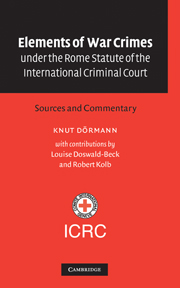 Elements of War Crimes under the Rome Statute of the International Criminal Court
Elements of War Crimes under the Rome Statute of the International Criminal Court Book contents
- Frontmatter
- Contents
- Foreword by Dr Jakob Kellenberger, President of the International Committee of the Red Cross
- Foreword by Ambassador Philippe Kirsch, QC
- Table of cases by alphabetical order
- Table of cases by jurisdiction
- Table of treaties and other international instruments
- List of abbreviations
- 1 Introduction
- 2 Legal value of the elements of crimes
- 3 General Introduction adopted by the PrepCom
- 4 Introduction to elements of war crimes listed in Article 8 of the Rome Statute
- 5 Article 8(2)(a) ICC Statute – Grave breaches of the 1949 Geneva Conventions
- 6 Article 8(2)(b) ICC Statute – Other serious violations of the laws and customs applicable in international armed conflict
- 7 Article 8(2)(c) ICC Statute – Violations of common Article 3 of the 1949 Geneva Conventions
- 8 Article 8(2)(e) ICC Statute – Other serious violations of the laws and customs applicable in armed conflicts not of an international character
- Appendix: Request from the Governments of Belgium, Finland, Hungary, Mexico, the Republic of Korea and South Africa and the Permanent Observer Mission of Switzerland to the United Nations regarding the text prepared by the International Committee of the Red Cross on the mental element in the common law and civil law systems and on the concepts of mistake of fact and mistake of law in national and international law
- Bibliography
- Index
1 - Introduction
Published online by Cambridge University Press: 08 August 2009
- Frontmatter
- Contents
- Foreword by Dr Jakob Kellenberger, President of the International Committee of the Red Cross
- Foreword by Ambassador Philippe Kirsch, QC
- Table of cases by alphabetical order
- Table of cases by jurisdiction
- Table of treaties and other international instruments
- List of abbreviations
- 1 Introduction
- 2 Legal value of the elements of crimes
- 3 General Introduction adopted by the PrepCom
- 4 Introduction to elements of war crimes listed in Article 8 of the Rome Statute
- 5 Article 8(2)(a) ICC Statute – Grave breaches of the 1949 Geneva Conventions
- 6 Article 8(2)(b) ICC Statute – Other serious violations of the laws and customs applicable in international armed conflict
- 7 Article 8(2)(c) ICC Statute – Violations of common Article 3 of the 1949 Geneva Conventions
- 8 Article 8(2)(e) ICC Statute – Other serious violations of the laws and customs applicable in armed conflicts not of an international character
- Appendix: Request from the Governments of Belgium, Finland, Hungary, Mexico, the Republic of Korea and South Africa and the Permanent Observer Mission of Switzerland to the United Nations regarding the text prepared by the International Committee of the Red Cross on the mental element in the common law and civil law systems and on the concepts of mistake of fact and mistake of law in national and international law
- Bibliography
- Index
Summary
General background
The establishment of the [International Criminal] Court has at last provided international humanitarian law with an instrument that will remedy the shortcomings of the current system of repression, which is inadequate and all too often ignored. Indeed, the obligation to prosecute war criminals already exists, but frequently remains a dead letter. It is therefore to be hoped that this new institution, which is intended to be complementary to national criminal jurisdictions, will encourage States to adopt the legislation necessary to implement international humanitarian law and to bring violators before their own courts.
(Statement by the International Committee of the Red Cross (ICRC), United Nations General Assembly, 53rd session, Sixth Committee, item 153 of the agenda, New York, 22 October 1998)On 17 July 1998 the United Nations Diplomatic Conference of Plenipotentiaries on the Establishment of an International Criminal Court (ICC) adopted the Rome Statute of the International Criminal Court. The UN General Assembly had first recognised the need for such a court in 1948, in view of the Nuremberg and Tokyo trials that followed the Second World War. Its creation had been under discussion at the UN ever since. The Statute's adoption in 1998 may therefore be seen as the fruit of some fifty years of effort.
As pointed out by the ICRC in the same statement quoted above, ‘[b]y adopting this treaty the great majority of States clearly demonstrated their resolve to put an end to the impunity enjoyed by the perpetrators of the most heinous crimes, and hence to deter the commission of further violations’.
- Type
- Chapter
- Information
- Elements of War Crimes under the Rome Statute of the International Criminal CourtSources and Commentary, pp. 1 - 7Publisher: Cambridge University PressPrint publication year: 2003
- 1
- Cited by
